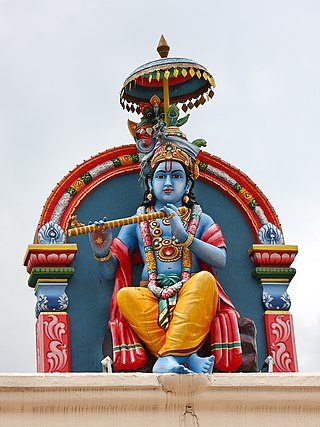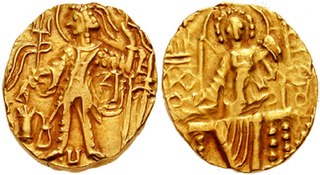Related Research Articles

Kabul is the capital and largest city of Afghanistan. Located in the eastern half of the country, it is also a municipality, forming part of the Kabul Province; it is administratively divided into 22 municipal districts. According to 2023 estimates, the population of Kabul was 4.95 million people. In contemporary times, the city has served as Afghanistan's political, cultural, and economical center, and rapid urbanisation has made Kabul the 75th-largest city in the world and the country's primate city.

Krishna is a major deity in Hinduism. He is worshipped as the eighth avatar of Vishnu and also as the Supreme God in his own right. He is the god of protection, compassion, tenderness, and love; and is one of the most popular and widely revered among Hindu divinities. Krishna's birthday is celebrated every year by Hindus on Krishna Janmashtami according to the lunisolar Hindu calendar, which falls in late August or early September of the Gregorian calendar.

Devaki is a character in Hindu literature, most noted for being the mother of the god Krishna. She is one of the seven daughters of Devapa or Devaka, a king of the Yadu dynasty, and has four brothers. She is one of the wives of Vasudeva. Her cousin is Kamsa, the king of Mathura, a cruel tyrant who had been told by Narada that he had been an asura killed by Vishnu in his previous life (Kalanemi), exacerbating his wickedness. According to popular tradition, Devaki is considered to be an incarnation of Aditi, a mother goddess who was the daughter of Daksha and the wife of Kashyapa.

According to Hindu scriptures, Vasudeva, also called Anakadundubhi, is the father of the Hindu deities Krishna, Balarama, and Subhadra. He was a king of the Vrishnis, and a Yadava prince. The son of the Yadava king Shurasena, he was also the second cousin of Nanda, the foster-father of Krishna. His sister Kunti was married to Pandu.

Kapisa is the smallest of Afghanistan's thirty-four provinces and is located in the north-east of the country. It has an estimated population of 496,840 people and an area of 1,842 km2 (711 sq mi), making it the most densely populated province apart from Kabul Province. It borders Panjshir Province to the north, Laghman Province to the east, Kabul Province to the south and Parwan Province to the west. Mahmud-i-Raqi is the provincial capital, while the most populous city and district of Kapisa is Nijrab.

Vāsudeva I was a Kushan emperor, last of the "Great Kushans." Named inscriptions dating from year 64 to 98 of Kanishka's era suggest his reign extended from at least 191 to 232 CE. He ruled in Northern India and Central Asia, where he minted coins in the city of Balkh (Bactria). He probably had to deal with the rise of the Sasanians and the first incursions of the Kushano-Sasanians in the northwest of his territory.

Vasudeva II was a Kushan emperor who ruled c. 275–300 CE. He was probably the successor of Kanishka III and may have been succeeded by an emperor named Shaka Kushan.

The Kanva dynasty or Kanvayana was the eighth ruling dynasty of Magadha, established after Vasudeva Kanva overthrew the preceding Shunga dynasty and ruled from 73 BCE to 28 BCE.

The Heliodorus pillar is a stone column that was erected around 113 BCE in central India in Besnagar. The pillar was called the Garuda-standard by Heliodorus, referring to the deity Garuda. The pillar is commonly named after Heliodorus, who was an ambassador of the Indo-Greek king Antialcidas from Taxila, and was sent to the Indian ruler Bhagabhadra. A dedication written in Brahmi script was inscribed on the pillar, venerating Vāsudeva (krishna), the Deva deva the "God of Gods" and the Supreme Deity. The pillar also glorifies the Indian ruler as "Bhagabhadra the savior". The pillar is a stambha which symbolizes joining earth, space and heaven, and is thought to connote the "cosmic axis" and express the cosmic totality of the Deity.

Kashmir Shaivism or Trika Shaivism, is a nondualist Hindu tradition of Shaiva-Shakta Tantra which originated in Kashmir sometime after 850 CE. Since this tradition originated in Kashmir it is often called "Kashmiri Shaivism". It later went on to become a pan-Indian movement termed "Trika" by its great exegete, Abhinavagupta, and particularly flourished in Odisha and Maharashtra. Defining features of the Trika tradition are its idealistic and monistic Pratyabhijna ("Recognition") philosophical system, propounded by Utpaladeva and Abhinavagupta, and the centrality of the three goddesses Parā, Parāparā, and Aparā.

The Bhagavata tradition, also called Bhagavatism, refers to an ancient religious sect that traced its origin to the region of Mathura. After its syncretism with the Brahmanical tradition of Vishnu, Bhagavatism became a pan-Indian tradition by the second century BCE, according to R.C. Majumdar.

Kamsa was the tyrant ruler of the Vrishni kingdom, with its capital at Mathura. He is variously described in Hindu literature as either a human or an asura; The Puranas describe him as an asura, while the Harivamśa describes him as an asura reborn in the body of a man. His royal house was called Bhoja; thus, another of his names was Bhojapati. He was the cousin of Devaki, the mother of the deity Krishna; Krishna ultimately fulfilled a prophecy by slaying Kamsa.

Ananta Vasudeva Temple is a Hindu temple dedicated to Krishna, an avatar of Vishnu located in Bhubaneswar, the state capital of Odisha, India. The temple was constructed in the thirteenth century, and the complete murtis of Krishna, Balarama and Subhadra are worshipped there. The temple dates back to the period of Chandrika Devi, the daughter of Anangabhima III, during the reign of the king Bhanudeva. A commemorative inscription that marked the foundation of the temple can be found in the British Museum's collection.

Vasudeva III was possibly the son of Vasudeva II and a ruler of the Kushan Empire c. 360-365 CE.
Vasudeva IV was reportedly a king ruling one the remnants of the Kushan Kingdom from Kandahar. He was the possible father of Vasudeva of Kabul.

Vāsudeva, later incorporated as Vāsudeva-Krishna, Krishna-Vāsudeva or simply Krishna, was the son of Vasudeva Anakadundubhi, king of the Vrishnis in the region of Mathura. He was a leading member of the Vrishni heroes, and may well have been an historical ruler in the region of Mathura.
The Kingdom of Kapisa was a state located in what is now Afghanistan during the late 1st millennium CE. Its capital was the city of Kapisa. The kingdom stretched from the Hindu Kush in the north to Bamiyan and Kandahar in the south and west, out as far as the modern Jalalabad District in the east.

Vasudeva Nanayakkara is a Sri Lankan left-wing politician, Member of Parliament and presidential candidate in the 1982 and 1999 Sri Lankan presidential elections.

Kollengode Palace is a palace situated in Thrissur town of Thrissur district, Kerala state, India.

Vasudeva Upanishad (Sanskrit: वासुदेव उपनिषत्, or Vasudevopanishad is one of 108 Upanishadic Hindu texts, written in Sanskrit language. It belongs to the Vaishnava sect, which worships Vishnu and his avatar Krishna, and this late medieval era minor Upanishad is attached to the Samaveda. It is one of the 14 Vaishnava Upanishads dedicated to Vaishnava sacred marks, including the Urdhva Pundra - the Vaishnava tilaka. It is described in a sermon by Krishna to the sage Narada.